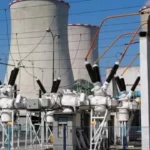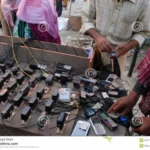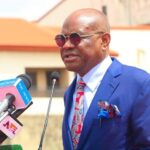Executive orders which have their origin in the United States have generally crept into our political lexicon in the last five years courtesy of Acting President Yemi Osinbajo in 2017.
President Buhari’s administration is on record as being the first to consciously determine to address Nigeria’s perennially low ranking in global ease of doing business (EDB)/competitive ratings, acknowledging the inevitability of taking composite reform actions to significantly improve Nigeria’s EDB ranking.
- Suspect: How I slaughtered, buried teenage hawker in a shallow grave
- Burna Boy comes up with really crazy ideas — Mum
In pursuance of the declared goal to improve the country’s EDB ratings, on May 18, 2017, the then-acting president issued three Executive Orders (EOs); effective immediately and targeting public service improvements to touch every sphere of Nigeria’s economy.
In this analysis, we focus on one of the EOs, the 26 paragraph Executive Order on the Promotion of Transparency and Efficiency in the Business Environment with its attendant implications on businesses and investors in Nigeria.
This EO is particularly focused on improving Nigeria’s EDB through transparent and efficient service delivery by various government Ministries, Departments and Agencies (MDAs).
To promote transparency in MDAs’ dealings, the EO makes it mandatory for them to make public all the requirements for licence, permits, waivers, approvals and tax-related information.
Port Operations
The ports play a critical role in Nigeria’s economy and their historic sub-optimality has resulted in massive loss of revenues (e.g. on goods diverted to neighbouring West African ports but would end up being smuggled into, and consumed in Nigeria).
Users of the ports have faced various challenges in the past ranging from congestion, delayed cargo clearance, touting and uncoordinated actions of duplicative agencies, amongst others.
To ameliorate these challenges faced by users, the EO prohibits any form of touting by official or unofficial persons while allowing only on-duty staff, and except with the permission of the head of the agency, an off-duty staff at the ports.
This is to enhance the proper identification of officials on duty and any form of solicitation could be reported to the appropriate authority.
To ease operations at the ports, all MDAs are required to make arrangements to merge into a single customer interface, making them customer/investor/tourist-friendly while taking account of inflow and outflow data which would be sent to the National Bureau of Statistics (NBS).
By implication, time spent undergoing numerous checks at the ports would be significantly reduced.
More so, the port operation is to run on a 24-hour circle paving way for increased commercial activities, given the EO’s prescription for a 48-hour cargo clearance timeline.
Executive Order for Planning and Execution of Projects, Promotion of Nigerian Content in Contracts (Order 5)
Not long after, the Presidential Executive Order for Planning and Execution of Projects, Promotion of Nigerian Content in Contracts and Science, Engineering and Technology (Order 5) was signed by President Muhammadu Buhari in February 2018.
Order 5 is a general provision for “Local content” in federal government contracts. It is not sector-specific as some other local government regulations are (e.g. the Coastal and Inland Shipping (Cabotage Act), 2003 for the maritime industry; and the Nigerian Oil and Gas Industry Content Development Act, 2010 for the oil and gas industry).
Order 5 directs “procuring entities” to give preference to Nigerian companies and firms in the award of contracts in line with the Public Procurement Act (2007) (PPA). “Procuring entity” is not defined under Order 5, but it is defined under the PPA as any public body engaged in procurement.
This implies that the PPA definition of “procuring entities” applies under Order 5. A “Nigerian company” is defined as a company incorporated in Nigeria under the Companies and Allied Matters Act (1990) with no less than 51% equity shares held by Nigerians.
MAN says nothing has changed
The Chairman, Manufacturers Association of Nigeria (MAN) Export Group, Chief Ede Dafinone, in his reaction said: “We are yet to feel the impact of a single window. There might be some changes but it is not significant because we are still struggling to bring out goods from the ports.”
He said an executive order not backed by law would be difficult to implement.
“So in the light of what we have seen, my export members would say it is not working for them,” he added.
MAN president Engr. Mansur Ahmed recently called on the president, as the chairman of the Presidential Motoring Committee for Implementation of Executive Order 005, to direct that the Ministry of Science Technology and Innovation to inaugurate the secretariat that will implement the strategies for the executive order.
“As a test case of this initiative, we humbly request that Mr President directs SON to certified local manufacturers of LPG gas cylinders be specifically designated as priority provider of the 10 million cooking gas cylinders to be procured by the federal government for 12 states in the federation,” Mansur said.
Similarly, the President, National Association of Nigerian Traders (NANTS) Barrister Ken Ukaoha said: “It is annoying that none of these policies is producing results. Effective result as envisaged and therefore pulling back the progress it should have had. If anything, we appear to be more retrogressive.
“On the patronage of local products, what we see in practice is that the National Assembly left the Innoson and Peugeot and brutally went for Toyota without any remorse, thereby destroying the auto sector.
“What they have done is to continuously donate jobs to Japan.”
He said in the Ministries, Departments and Agencies of government, even the tea is made in China, Europe and America. “The furniture is mostly from Italy.”
He further explained that in terms of trade facilitation, clearing a container from a Lagos port takes N450,000 from Wharf to Ijesha in the same state.
He said: “After the release order at the gate, you have to pay an additional N400,000 in bribes to be allowed to go out.
“The Customs has many units and departments that scrape money out of your pocket.”
‘Consequence for lack of compliance’
The Chief Executive Officer, Centre for the Promotion of Private Enterprise, Dr Muda Yusuf, agrees with previous analysts that the executive orders are not implemented sufficiently enough.
He said there is the issue of political will to drive the process. “It appears people along the chain are too powerful to be compelled to comply.
“The customs at the port kept saying security takes precedence, and in hiding under that cover, they set aside everything.
“So the agencies have a way of circumventing the directives and so the government must demonstrate consequence for lack of compliance.
“All these people are the employees and appointees of the president and unless he shows that political will, even if you legislate on it, it will not happen. The machine of enforcement is very important,” Yusuf said.

 Join Daily Trust WhatsApp Community For Quick Access To News and Happenings Around You.
Join Daily Trust WhatsApp Community For Quick Access To News and Happenings Around You.


